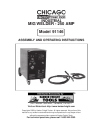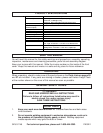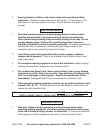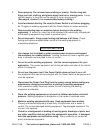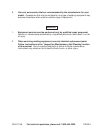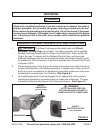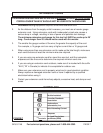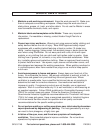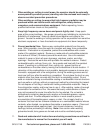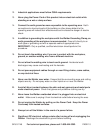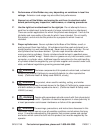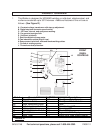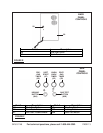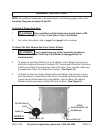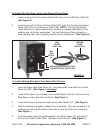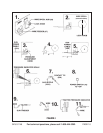SKU 91146 For technical questions, please call 1-800-444-3353. PAGE 9
8. When welding or cutting, be aware that high frequency radiation may be
produced which can interfere with radio navigation, safety devices,
computers, and communications equipment. Before operating, have a
qualified technician check out that possibility.
7. When welding or cutting in small areas, the operator should be externally
accompanied by another person (standing
near
the enclosed work area) to
observe accident prevention procedures.
9. Keep high frequency source doors and panels tightly shut. Keep spark
gaps at the correct settings. Use proper grounding and shielding to minimize the
possibility of interference. Keep all cables close together and close to the
ground. Locate the welding or cutting operation as far as possible from sensitive
electronic equipment, or have the electronic equipment shut down temporarily.
10. Prevent accidental fires. Remove any combustible material from the work
area. When possible, move the work to a location well away from combustible
materials. If relocation is not possible, protect the combustibles with a cover
made of fire resistant material. Remove or make safe all combustible materials
for a radius of 35 feet (10 meters) around the work area. Use a fire resistant
material to cover or block all open doorways, windows, cracks, and other
openings. Enclose the work area with portable fire resistant screens. Protect
combustible walls, ceilings, floors, etc., from sparks and heat with fire resistant
covers. If working on a metal wall, floor, ceiling, etc., prevent ignition of
combustibles on the other side by moving the combustibles to a safe location. If
relocation of the combustibles is not possible, designate someone to serve as a
fire watch, equipped with a fire extinguisher, during the welding process and at
least one half hour after the welding is completed. Do not place the torch on any
material other than bare concrete until the torch is completely cooled. Do not
weld on materials having a combustible coating or combustible internal structure
such as walls or ceilings, without an approved method for eliminating the hazard.
Do not dispose of hot slag in containers holding combustible materials. Keep a
fire extinguisher nearby, and know how to use it. After welding, make a thorough
examination for evidence of fire. Be aware that easily visible smoke or flame
may not be present for some time after the fire has started. Do not weld in
atmospheres containing dangerously reactive or flammable gasses, vapors,
liquids, and dust. Provide adequate ventilation in work areas to prevent
accumulation of flammable gases, vapors, or dust. Do not apply heat to a
container that has held an unknown substance or a combustible material whose
contents, when heated, can produce flammable or explosive vapors. Clean and
purge containers before applying heat. Vent closed containers, including
castings, before preheating or welding. Note: Use caution when welding
galvanized metal; toxic gases are formed and must be ventilated properly.
11. Read and understand all instructions and safety precautions as outlined in
the manufacturer’s manual for the material you will weld.



